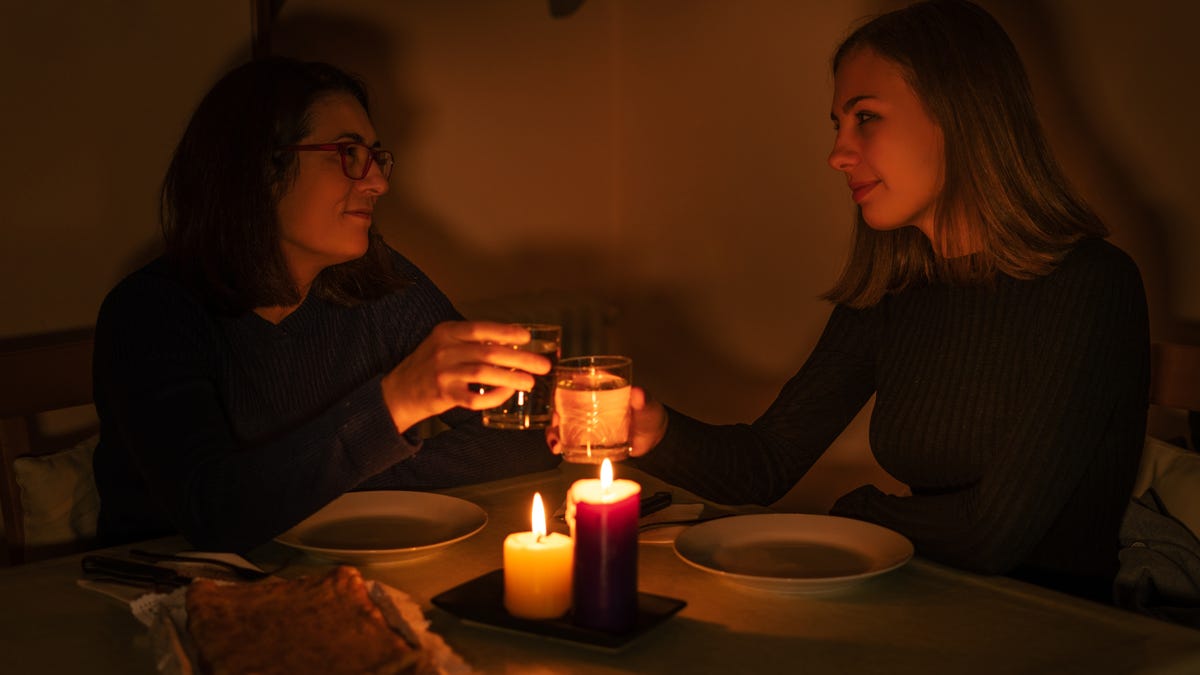 Why You Can Trust CNET
Why You Can Trust CNET A Guide to Blackouts: Why They Happen and How to Stay Safe
You can't stop a power outage, but you can learn how to prepare for one.

Candles can provide more than ambience in a blackout.
Blackouts aren't just annoying. They can be dangerous if you're unprepared. Sure, power outages can interrupt your favorite TV show. But they can also cause food to spoil, cut air conditioning during a heat wave and impact medical devices. While you can't stop power outages from happening, you can prepare today before the next one comes.
Hurricane season will be here before you know it, but wildfires, storms and other inclement weather events can lead to blackouts, too. Even if you own a generator, portable power station or solar panels with a backup battery, taking the following steps can help you navigate a power outage with less stress and worry.
Here are additional ways your phone can help and how to keep your pets safe during natural disasters. Plus, the five things that could help you survive a power outage.
Why do blackouts happen?
Blackouts happen for many reasons. In May 2022, the North American Electric Reliability Corporation warned of an increased risk of blackouts through much of western North America. At the time, the prospect of a hotter than normal summer, lower than normal hydroelectric reservoirs and potentially higher than normal demand for electricity looked like it could lead to power outages. With less supply from hydroelectric sources and more demand for cooling homes, supply could have fallen short.
More common reasons for blackouts are weather related. Wildfires, hurricanes, thunderstorms and snowstorms can bring down power lines or disrupt electricity generation, causing blackouts. As extreme weather gets more intense due to climate change, more blackouts could be a consequence.
If blackouts do occur in your area, there are a few things you can do beforehand to prepare.
Read more: Do Blackouts Affect Homes With Solar Panels? Sometimes
Why prepare for a blackout?
Blackouts are disruptive, plain and simple. Those disruptions could range from something as minor as an interrupted TV show to as life-threatening as a temperature-sensitive medicine going bad.
Most people grew up doing fire drills in school. Earthquake drills are expected on the West Coast. Tornado drills throughout the Midwest and South are regular occurrences. While blackouts pose less of an immediate danger, you can take a few steps to make sure you're as safe as can be.
How to prepare for a blackout: A checklist
The Department of Energy has a list of some things to have on hand for blackout preparation. That list is reflected below, with a few additions.
- Flashlights and batteries: The DOE suggests a flashlight in every room, but it seems good enough to have plenty of lights and batteries handy. Sure, phones have flashlights, but if a blackout carries on for a while, you might want to save that phone charge for other tasks, like communication or entertaining a kid.
- Candles and matches: Candles don't run out of battery and matches are a reliable fire starter. Take extra caution with open flames, don't leave them unattended and don't use them if there's a risk of a gas leak.
- Alternative lighting: Getting a solar lantern that can recharge without plugging in or LED lanterns with long-lasting batteries are two other ways to safely light your house.
- Your utility's emergency number: If you smell a gas leak, you don't want to be reliant on Wi-Fi to pull up your utility's emergency number. Write it down somewhere.
- Backup generator: Generators can be big purchases but can provide backup energy. If you get one, make sure it is safely installed and far from your windows to avoid carbon monoxide poisoning.
- Ice packs and a cooler: If you have medicine that needs to stay cold, make sure you have some ice packs and a cooler ready. Then, only open it when you need it. Each time it's opened, warm air gets in and reduces the time the interior will stay cold. The same goes for your fridge and freezer.
- Water: If you get water from a well, you'll need to keep water on hand. The DOE suggests one gallon a day per person.
- Food: Keep some food that's nonperishable and doesn't require cooking. Canned goods would work well here.
- First aid kit: You can stock your own first aid kit or buy one from the Red Cross.
- Disaster plan: Decide beforehand where you and your family will meet if your home isn't an option and communication isn't possible.
- Locations of cooling or warming stations: Cities often have cooling stations in the summer (or warming stations in the winter). If your air conditioning or furnace is out, make sure you know places you can head if it gets dangerously hot or cold.
What to do after a blackout
After the power comes back, the hard part is over, but you'll need to dispose of any spoiled food or medicine. With food, it's best to err on the side of caution. Throw things away if they've been unrefrigerated (above 40 degrees) for two or more hours, the Department of Homeland Security says. (The department runs the website Ready.gov with tips to prepare for almost any kind of disaster.) With medicines, it's best to consult with your doctor.
A blackout is bound to bring some sort of inconvenience, but managing those problems and staying safe is possible with just a bit of preparation.

